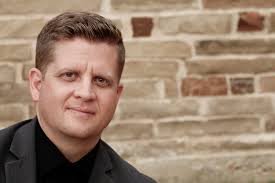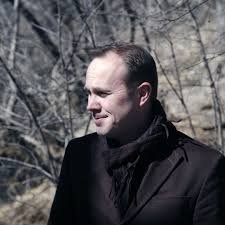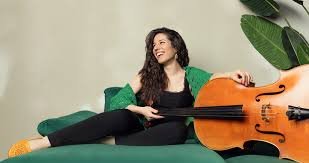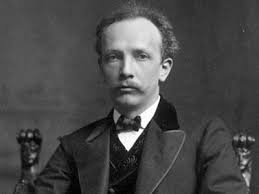Shimmers English
Agarita collaborates with composer Ethan Wickman, singers Tynan Davis and Megan Pachecano, and organist Andrew Lloyd for an exotic program in the iconic Chapel of the Incarnate Word, featuring the premiere of Wickman’s Shimmers of Byzantium, among other inspired works.
FEATURING
Tynan Davis, mezzo-soprano
Andrew Lloyd, organ
Megan Pachecano, soprano
Ethan Wickman, oud
PROGRAM
Franghiz Ali-Zadeh | Habil-Sajahy
Antonín Dvořák | Piano Trio No. 4 in E minor, Op. 90 “Dumky” | Andante moderato
Andrea Casarrubios | Maktub | Mirage
Johannes Brahms | Weg der Liebe, Op. 20: No. 2
Emmy Frensel Wegener | String Trio | Fugato | Inleiding | Scherzo
Richard Strauss | Morgen!
Ethan Wickman | Shimmers of Byzantium
FOR A FULL LIST OF OUR SUPPORTERS AND TO SUPPORT AGARITA, CLICK ON THE LINK BELOW.
Tynan Davis is a playful vocalist and human. She won a Grammy for Best Opera Recording with Boston Modern Orchestra Project’s Fantastic Mr. Fox; singing a cider-drunk cellar rat named Rita. She’s toured with Wynton Marsalis and the Jazz at Lincoln Center Orchestra and the 25th anniversary North American tour of Phantom of the Opera. Her solo jazz album TYNAN is available on most streaming platforms, and is full of happy tunes you’ll know and love. Other favorite musical collaborations include Roomful of Teeth, Cantata Profana, Artefact Ensemble & The All’s Well Sisters. Tynan is also a passionate teacher and clinician, the mother of a ridiculously cute kid, and the wife of an insanely creative Broadway Properties Master.
S. Andrew Lloyd, whose music has been described as “monumental, hair-raising, and leaving you agape in awe” (Classical Music Sentinel), is a concert organist and composer, and the Bess Hieronymus Endowed Fellow and Assistant Professor of Organ and Composition at the University of Texas at San Antonio, as well as the 2019/2020 Marlin K. Jensen Artist in Residence at the University of Utah, having previously worked at the University of North Texas, and Texas Woman’s University.
A recipient of a Barlow Endowment commission and winner of the first Ariel Bybee Endowment Commission Competition for a collection of art songs written for soprano Rachel Willis-Sørensen, Lloyd’s compositions have been performed all over the world including Carnegie Hall, the Cathédrale de Notre Dame and La Trinité in Paris, the National Cathedral in Washington DC, Riverside Church New York, Trinity Church and Methuen Hall Boston, the Salt Lake Tabernacle, Moscow Catholic Cathedral in Russia, and venues in South Africa, Switzerland, Taiwan, and the 2024, 2018, and 2016 National AGO Conventions in San Francisco, Kansas City, and Houston respectively.
Lloyd’s works have been performed by many notable performers and ensembles including soprano Rachel Willis-Sørensen, Hungarian pianist Éva Polgár, organists Richard Elliott and Monica Berney, Rick Bjella and the San Antonio Chamber Choir, Jerry McCoy and the Fort Worth Chorale, Ryan Chatterton and the Choral Artists of Fort Worth, Steve Durtschi and the Cantorum Chamber Choir, baritone Jeffrey Snider, violinist Julia Bushkova, tenor William Joyner, and soprano Jennifer Youngs.
A recording of Lloyd’s monumental art mass, Christus was released in 2017 on the Neumark label, and featured on Pipedreams public radio in December of 2018.
As an active recitalist, Andrew Lloyd has performed at venues throughout the world including: the Salt Lake Tabernacle, as a featured recitalist on the prestigious Eccles International Organ Festival at the Cathedral of the Madeleine in Salt Lake City, Hill Auditorium at the University of Michigan, La Merced in Panama City, Panama, and venues in Florida, Idaho, Iowa, Kansas, Louisiana, Michigan, Texas, Utah, Virginia, and Washington State.
Originally from Spokane, WA, Lloyd (b. 1979) earned degrees from the University of North Texas (DMA) the University of Kansas (MM), and Brigham Young University (BM). He studied with the notable composers and organists Forrest Pierce, Jon Nelson, Andrew May, James Worlton, James Higdon, Jesse Eschbach, Douglas Bush, Janet Ahrend, and Barbara Lloyd.
Praised for her “lucid soprano” (The New York Times), Megan Pachecano has performed on such stages as Carnegie Hall and the Metropolitan Opera, under the batons of Yannick Nézet-Séguin, Gustavo Dudamel, and other illustrious artists. She brings a “shimmering lyric soprano” (Opera News) to rare roles such as Beatriz in Catán’s La hija de Rappaccini with Chicago Opera Theater, an Emmy-nominated production, and the title role of Lady Jane Grey in the World Premiere performance and commercial recording of Rosner’s The Chronicle of Nine: The Tragedy of Queen Jane with Grammy-winning ensembles Odyssey Opera and the Boston Modern Orchestra Project. Other treasured experiences include a live broadcast performance on Radio Television Hong Kong as Valencienne (The Merry Widow) with Musica Viva HK and many productions with the Metropolitan Opera Chorus. Some favorite roles have been Adina (L’elisir d’amore), Norina (Don Pasquale), Susanna (Le nozze di Figaro), Fiordiligi (Così fan tutte), Cunegonde (Candide), Cinderella (Into the Woods), Frasquita (Carmen), Anne Page (Sir John in Love), Farinelli’s Trainer (Vinkensport, or The Finch Opera), Younger Alyce (Glory Denied), and Echo (Ariadne auf Naxos). She has sung with the Bayerische Staatsoper, Austin Opera, Caramoor International Music Festival, Opera Saratoga, American Lyric Theater, St. Petersburg Opera, the Opera Company of Middlebury, Opera in Williamsburg, and the Orchestra of New Spain at the Dallas Symphony Orchestra’s Soluna Festival, among others.
A frequent concert soloist, Ms. Pachecano has performed Handel’s Messiah, Israel in Egypt, Samson, Jephtha, Saul, and made her Lincoln Center solo debut at Alice Tully Hall with an excerpt from Judas Maccabaeus. She has also performed the solos in Mozart’s Great Mass in C minor, Coronation Mass, Requiem, and Exsultate, jubilate, Haydn’s Lord Nelson Mass and Little Organ Mass, Ravel’s Shéhérazade, Beethoven’s Die Ruinen von Athen, and Villa-Lobos’ Bachianas Brasileiras No. 5 singing with the Helena Symphony, Wheeling Symphony, San Antonio Mastersingers and SA Phil, Round Rock Symphony Orchestra, Mid-Texas Symphony, Astoria Symphony Orchestra, Colorado Pops Orchestra, Ad Astra Music Festival, Westminster Choral Festival, and Grace Chorale of Brooklyn. She was a soloist on the Naxos recording American Choral Music and recently performed Zipoli’s Zuipaqui with Opera Hispánica for the Univision Television Network’s “Serenata a la Virgen de Guadalupe” Live Broadcast. She next makes her debut with the exciting San Antonio chamber ensemble, Agarita, performing Ethan Wickman’s “Shimmers of Byzantium.”
Ms. Pachecano presented a solo cabaret recital with the Odeon Theater’s Concert Series and has performed in musical theatre showcases at the Ensemble Studio Theatre, The PIT, and Daryl Roth Theatres in New York City as well as having the honor of singing in the Peter Shaffer Memorial at the American Airlines Theatre on Broadway. She created the role of Elizabeth on the cast album of Melillo’s Son of the Storm and was a soloist on the Naxos recording American Choral Music. As Guest Artists at Colorado State University, she and Mezzo-Soprano Sarah Nelson Craft gave a duet art song recital entitled The Tides of Love. The two have enjoyed much critical notice of their vocal blend, together called “pliant and luminous” and praised for their “fluid, robust singing.” As a guest clinician, Ms. Pachecano regularly delivers educational seminars, and was most recently presented by the Belle Époque Magique Concert Series in Leysin, Switzerland in a dual workshop and recital format.
Ms. Pachecano holds a Master of Classical Voice (Manhattan School of Music) and a Bachelor of Voice Performance (University of Texas at Austin, Butler School of Music). She is a Grammy-voting member of the Recording Academy and serves on the Classical Membership Committee.
Described as a "composer of facility and imagination, the kind to whom both performers and audiences respond" (The New York Times), composer Ethan Wickman's (b. 1973) music has been performed by soloists and ensembles in venues in the U.S. and around the world. He has received grants and commissions from the Barlow Endowment, Meet the Composer, the American Composers Forum, the Wisconsin Music Teachers Association, the Utah Arts Festival, the San Antonio Opera Guild, and Chicago's Music In The Loft where he was the 2014-15 Composer-In-Residence. He was awarded the Jacob Druckman prize for his orchestral work Night Prayers Ascending at the Aspen Music Festival, the Harvey Phillips Award for his work Summit from the International Tuba Euphonium Association, first place in the Utah Arts Festival Chamber Commission Competition, and was a finalist in the 25th annual ASCAP Rudolf Nissim Orchestral Composition Competition. He has received fellowships from the Aspen Music Festival, the Norfolk Contemporary Music Workshop/Yale Summer School of Music, the Wellesley Composers Conference, the American Composers Orchestra/Earshot New Music Readings, and from the U.S. State Department as a Fulbright Fellow in Madrid, Spain. His works have been performed by such ensembles as the Aspen Concert Orchestra, the Avalon String Quartet, the Soli Ensemble, the Newton Symphony, the Gryphon Trio, Flexible Music, the Minneapolis Trio, the Novo Ensemble, Ensemble 61, the Post-Haste Reed Duo, Zeitgeist, and by many performers at venues such as Carnegie Hall, the Kennedy Center, and at universities and concert halls both domestic and international. Recent recordings have garnered critical acclaim as "the most attractive new string quartet I have heard in a long while" (Fanfare), "epic and dreamy" (The New York Times), "absorbing" (American Record Guide), and possessing "stunning breadth and poise" (Time Out Chicago).
Wickman holds a DMA in composition from the University of Cincinnati College-Conservatory of Music, with additional degrees from Boston University (MM) and Brigham Young University (BM). Formerly on the faculties of Indiana University-South Bend and the University of Wisconsin-Eau Claire, he is Professor of Music Composition and Theory at the University of Texas at San Antonio. In addition, from 2015-2020 he was Executive Director of the Barlow Endowment for Music Composition at Brigham Young University.
PROGRAM NOTES
Habil-Sayagi (In the Style of Habil) by Azerbaijani composer Franghiz Ali-Zadeh is originally a work for cello and piano inspired by the artistry of Habil Aliyev, a virtuoso of the kamancheh (“little bow”) a small, bowed Persian instrument. The unique extended techniques that Ali-Zadeh indicates for the pianist includes placing pearls along the strings of the piano, and also plucking them to provide a uniquely exotic timbre. The special use of the high register of the cello, the use of Middle Eastern scales, and instructions for knocking on the instrument, all provide a special folk-like flavor. These techniques help for imitation of instruments like the kamancheh, the tar (long-necked lute), the ud (short-necked lute), the däf (a shell drum), and the gosh-nagara (small pair of clay timpani). A solo improvisation by Tynan Davis will be a tone-setting prelude to this highly emotional work, which we have arranged to include violin.
Czech composer Antonín Dvořák’s “Dumky” Trio is deservedly one of his most adored chamber works. It is a wholehearted homage to his Bohemian motherland, filled with wildly contrasting dances that shift between vibrant and joyful to devastatingly melancholic. As a result, the piece is emotionally rich and structurally unpredictable, allowing raw, improvisatory folk elements to take priority over traditional classical form. The fourth movement, on this evening’s program, begins with a pensive, clock-like texture over which the cello passionately sings. The inevitable accompaniment pattern, which returns throughout, is accented by playful, distracted outbursts and moments of unexpected delight.
Spanish-born cellist Andrea Casarrubios is an acclaimed soloist and chamber musician, with performances throughout Europe, Asia, Africa, and the Americas. First Prize winner of numerous international competitions and awards, Casarrubios has appeared at Carnegie Hall, Walt Disney Concert Hall, Lincoln Center, and the Piatigorsky, Ravinia, and Verbier Festivals. In addition to her accomplishments as a cellist, she is a world-class composer, winning a 2024 GRAMMY Award for Best Contemporary Classical Composition for her solo cello work Seven. About her work Maktub, Casarrubios writes:
This trio was written in Los Angeles for the VI Boccherini Festival in Spain. The first movement, Mirage, depicts desert soundscapes, in which the music travels from disorientation to a fierce, maddening folk dance. I have been living in the United States since I was 18, and it is one of the most wonderfully cosmopolitan places I have ever encountered. Maktub has those influences imprinted on the fabric of its music. In the Americas, along with musical trips to Asia and Europe, I met people from diverse backgrounds, people from whom I learned immensely, who opened up for me a wide range of knowledge, thoughts and sonorities.
With Robert Schumann as a mentor and Franz Schubert as one of his musical idols, it was inevitable that Johannes Brahms would devote himself to lieder, or art songs. The perfect marriage between poetry and music, these songs were an opportunity for Romantic composers to express themselves vulnerably, tell a clear story, and use musical techniques to clarify or enhance the meaning of words. Brahms’ duet op. 20 no. 2, Den gordischen Knoten “The Gordian Knot,” is an expression of love’s powerful, transcendent bind. Originally for two voices and piano, the work is performed with organ on this program. The patient “pedal-points” (repeated bass notes) and angelic vocal writing invite the colorful stops of the organ to imbue the song with a sacred, immortal timbre. The lyrics of the song, translated by Emily Ezust, are below:
The Gordian knot
Which love has tied,
Can it be broken, can it be untied
By mortal hands?
What are you striving for? What are you devising
With your cunning purposes?
Through what you are setting about
Love will find the way.
And if he were bolted up,
And if he were wrongly condemned,
With his name sealed off
And never uttered,
Sympathetic winds,
You would fly out to me
And bring me news
And bring him to me.
If you were far away across the mountains,
If you were far away across the sea,
I would hike through the mountains,
I would swim through the sea;
If, my love, you were a swallow
And you flew out by the stream,
I, my love, would be a swallow
And fly out to follow you.
Emmy Wegener, born in 1901 in Amsterdam, was a poet, violinist, and composer. Her Suite for String Trio is an early work of hers. Its delightful, light-hearted character makes it an emotional respite from the rest of this rather serious program. I have programmed the movements out of order, starting with the second Fugato movement, moving to the first Moderato movement, and finishing with the third Scherzo movement. The Fugato is written with irony, starting with an academic stuffiness yet finishing with a quirky jazz chord. The Moderato movement is filled with uncertain pizzicatos (plucking the string) and trills and only the occasional melody pops through. It is one big question mark. The Scherzo movement is overtly neoclassical, sounding like a scurrying work of Mendelssohn. Quite proper, almost Baroque, and clearly a joke.
Morgen! (“Tomorrow”) is the last of Richard Strauss’ four songs, op. 27, set to the poem by John Henry Mackay. A wedding gift to his wife, soprano Pauline de Ahna, the song is a contemplative expression of a pure love. A lengthy introduction, which is essentially the entire melody, inspires the soprano to enter as if in the middle of deep reflection. She then comments on the repeated melody with delicate beauty, until a questioning chord halts the music – the sudden shift to a dramatic monotone reflects the moment of silent bonding, a nonverbal embrace and profound, timeless connection between the two lovers. A final iteration of the vulnerable melody by the violin seals the song. The lyrics by John Henry Mackay are below:
And tomorrow the sun will shine again
and on the way that I will go,
she will again unite us, the happy ones
amidst this sun-breathing earth,
and to the beach, wide, wave-blue
will we still and slowly descend
silently we will look in each other’s eyes
and upon us will sink the mute
silence of happiness
Written by Ethan Wickman, Shimmers of Byzantium was commissioned by The Barlow Endowment and written especially for this program. An accomplished composer with premieres in venues across the U.S. and around the world, Wickman has more recently been inspired to incorporate his interest in Middle Eastern music into his compositional voice. About Shimmers of Byzantium, Wickman has provided a substantial note:
The iconic and declarative first phrase of William Butler Yeats’s poem Sailing to Byzantium —“That is no country for old men”— spawned a novel by Cormac McCarthy and later an award-winning film by Joel and Ethan Cohen. The poem imagines its protagonist as one of advanced age, having become an anachronism in their own time, measuring the imminent demise of mortality against the enduring yearning for immortality. The narrator notes from the distance of years young lovers in each others arms, skies filled with bird song, oceans filled with fish—a world teeming with living abundance. Before this backdrop the narrator notes the specter of their own approaching death, observing in contrast to the youth that surrounds them that they are “but a paltry thing, a tattered coat upon a stick.” In the crux of this contradiction the narrator’s mind turns to the magnificence of ancient Byzantium and the majestic Hagia Sophia with its gold mosaics, Grecian goldsmiths, chanting “singing masters” of the soul, clergy, emperors, lords and ladies—all who within the imagination live in an ageless “artifice of eternity.” To Yeats and his sympathetic readers, this Byzantium is a chimeric figment of the mind’s eye, the ghost of a fictional past, but one for whom the yearning is as tangible as flesh and blood. Yeats’s narrator longs in their old age to be there, to join them in ageless, immortal form.
Shimmers of Byzantium meditates on this moment of reflection: what it means to feel anachronistic in one’s own time, to see one’s wrinkles, and yet to feel the vitality of youth within: the inherent contradiction between the aging of the body against the agelessness of the soul. In addition to setting the text of the Yeats poem, the work intersperses two short texts by the Ottoman Turkish poet Yahya Kemal Beyatlı. The latter was a poet, writer, and statesmen who lived to see the demise of the Ottoman Empire, many of its territories, and its transformation into the Turkish state. Like many writers of his generation, there is a feeling of nostalgic “hüzün” (a Turkish word designating grief or melancholy) at the loss of empire. Beyatlı’s words helps to locate this work in its spiritual home of Byzantium/Constantinople/Istanbul.
The work begins with a brief improvised cadenza known in Turkish music as a “taksim.” The ensemble then embarks on a peshrev—a musical form/genre that comes at the beginning of the multi-movement “fasil” in Ottoman classical music (or the start of a Sufi ceremony). Here, the ud (Turkish lute) joins the ensemble, drawing some of its material from modal scales (Turkish makam). What ensues throughout the remainder of the work is a conversation of sorts between the ensemble on the floor and the organ in the loft; the mezzo soprano on the floor, and the soprano in the loft. Consider the parallel to Yeats’s dialog between the mortal and immortal, and what transpires sonically may illuminate.
Text
Sailing to Byzantium, by William Butler Yeats
That is no country for old men. The young
In one another's arms, birds in the trees,
—Those dying generations—at their song,
The salmon-falls, the mackerel-crowded seas,
Fish, flesh, or fowl, commend all summer long
Whatever is begotten, born, and dies.
Caught in that sensual music all neglect
Monuments of unageing intellect.
An aged man is but a paltry thing,
A tattered coat upon a stick, unless
Soul clap its hands and sing, and louder sing
For every tatter in its mortal dress,
Nor is there singing school but studying
Monuments of its own magnificence;
And therefore I have sailed the seas and come
To the holy city of Byzantium.
O sages standing in God's holy fire
As in the gold mosaic of a wall,
Come from the holy fire, perne in a gyre,
And be the singing-masters of my soul.
Consume my heart away; sick with desire
And fastened to a dying animal
It knows not what it is; and gather me
Into the artifice of eternity.
Once out of nature I shall never take
My bodily form from any natural thing,
But such a form as Grecian goldsmiths make
Of hammered gold and gold enamelling
To keep a drowsy Emperor awake;
Or set upon a golden bough to sing
To lords and ladies of Byzantium
Of what is past, or passing, or to come.
End Of September, by Yahya Kemal Beyatlı
The days are brief, old folks of Kanlica
Remember all the autumns of the past.
Life is too short to love this district only...
I wish summers to last and days to be longer...
That rare drink quenched our thirst for years...
Ah! Life is too short for such a joy.
Death is our end, we're not afraid of it,
But it's hard to be away from the motherland.
Not to return from death's night to this shore
Is worse than death, this is the heart's desire.
Life, by Yahya Kemal Beyatlı
There is a halt where sea and sun appear,
There is a halt where both the worlds appear,
And the last halt—an autumn long drawn out
—
Where past and future as a dream appear.











